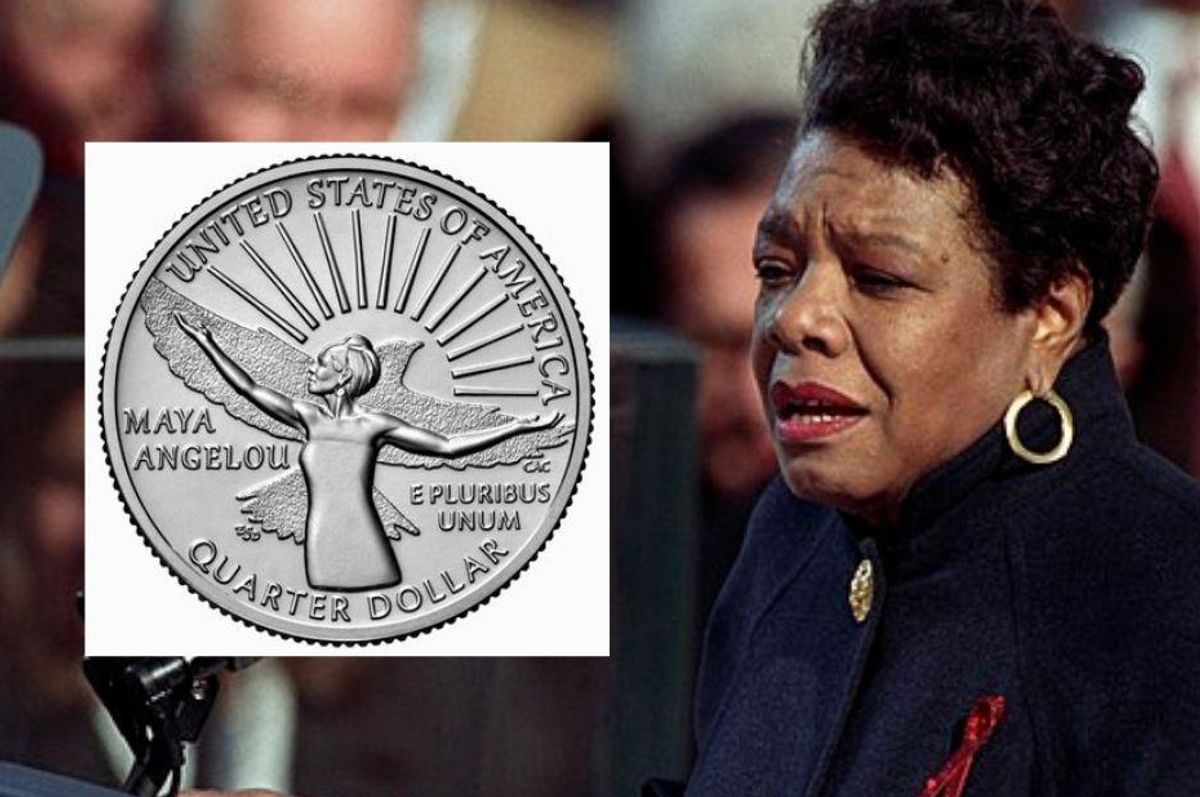A new series of U.S. quarters will feature 20 different women, starting with Maya Angelou

Maya Angelou is the first of 20 women who will be honored on the U.S. quarter.
For nearly all of U.S. history, the only people to have their likeness on the face of U.S. coins were men. In 1979, the Susan B. Anthony dollar coin honored the suffrage activist, Sacagawea was featured on a dollar coin in the 2000s and Hellen Keller got her own Alabama state quarter in 2003.
The U.S. Mint was established in 1792, so in 230 years, we've had just three women represented on our coins. But that ratio is about to change dramatically.
On Monday, the U.S. Mint launched its American Women Quarters Program with the release of a quarter bearing the likeness of poet Maya Angelou. It's the first time a Black woman has been on any American currency. The image shows Angelou with her arms spread wide in front of the wings of a soaring eagle.
Angelou's long-time assistant told journalist David Begnaud that Angelou "would be over the moon" about the honor.
The coin is the first of 20 that will be released in the next four years, with five women from various backgrounds, careers and institutions being featured each year.
After Maya Angelou, physicist and teacher Sally Ride will be featured on the quarter. Ride made history by being the first American woman in space when she flew in the Space Shuttle Challenger in 1983.
Maya Angelou was in the news today because the U.S. mint confirmed that it has starting shipping out quarters with her name & likeness on it.\nShe is the first black woman honored this way. \nHer longtime assistant told me tonight, \u201cshe would be over the moon\u201d.\nI miss her. Dearly.pic.twitter.com/uDnLKX25LB— David Begnaud (@David Begnaud) 1641871676
The remaining three women for 2022 will be Wilma Mankiller, the first woman to be elected as principal chief of the Cherokee Nation; Adelina Otero-Warren, a leader in New Mexico's suffrage movement and the first woman superintendent of Santa Fe public schools; and Anna May Wong, the first Chinese woman to star in Hollywood films and an activist who raised funds and advocated for Chinese refugees during World War II.
“Each time we redesign our currency, we have the chance to say something about our country — what we value, and how we’ve progressed as a society. I’m very proud that these coins celebrate the contributions of some of America’s most remarkable women, including Maya Angelou,” said Treasury Secretary Janet Yellen, according to Voice of America.
The initiative initially came from California Democratic Representative Barbara Lee, who has been working on legislation to get it passed since 2017. Lee told The 19th, “I wanted to make sure that women would be honored, and their images and names be lifted up on our coins. I mean, it’s outrageous that we haven’t. Hopefully the public really delves into who these women were, because these women have made such a contribution to our country in so many ways.”
The first coin of the American Women Quarters\u2122 Program is here\u2014the Maya Angelou Quarter! Learn about honoree Maya Angelou and #HerQuarter in our press release at https://bit.ly/34pX5vl\u00a0. Look for it in your change. @USTreasury @smithsonian @womenshistory @DrMayaAngelou @WCPInstpic.twitter.com/GVUpcnbszq— United States Mint (@United States Mint) 1641834181
Some people have pointed out the irony of having a Black woman on one side of the coin and the country's first slaveholding president on the other, but that's perhaps the most honest representation of the U.S. when you think about it. Others have pointed out that Harriet Tubman being featured on the $20 bill has not happened yet, despite the announcement being made nearly six years ago. And due to bureaucratic and anticounterfeit hiccups, we may not see that bill before the 2030 deadline.
Progress can be slow and is rarely perfect, but putting 20 women on quarters in the next four years is a heck of a lot better than our three in 230 years coin record up to now.
- 17 amazing women who probably aren't in history books, but should ... ›
- The first female U.S. mayor was nominated by men as a joke. She ... ›
- The #MeToo founder says the movement isn't just for women ... ›





 Rihanna Nails GIF
Rihanna Nails GIF

 Good luck trying to catch a gazelle.
Good luck trying to catch a gazelle. Chickens will eat just about anything.
Chickens will eat just about anything. There's actually a big difference between horses and zebras besides just the stripes.
There's actually a big difference between horses and zebras besides just the stripes. Stop Right There The End GIF by Freeform
Stop Right There The End GIF by Freeform